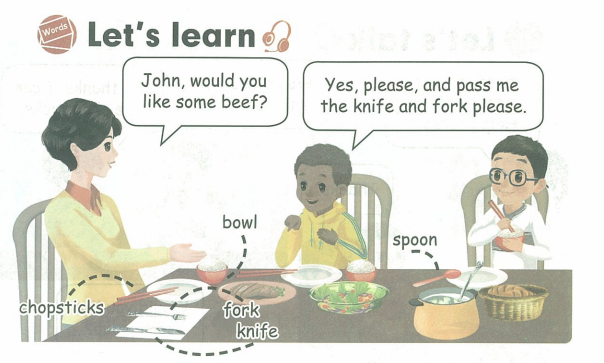50.下面是一篇小学词汇教学材料及其教学过程设计,请用中文从教师角色、活动设计等方面进行简要评述。
教学材料:

教学片断:
Step1: Warming-up
Let’s sing a song what would you like.
T: It’s time for lunch, I’m ready for lunch, what would you like?
S: I’d like some beef /rice/noodles/……..
(设计意图:从歌中复习已学食物的单词,轻快的旋律营造轻松愉快的学习氛围)
Step3: Presentation
1.导入学习单词:spoon.
T: The foods are delicious, and I want eat them. First, I want drink some soup, but how can I drink it? Can you tell me?
S: Spoon.
T: Yeah. Ok, please read after me [spu:n]
老师出示勺子实物,带读单词spoon,随即出示带该实物图片的单词卡片,教给学生单词发音,注意[u:]的发音。读几遍后检查学生掌握的情况,点名读该单词,在读的过程中注意纠正学生的发音。接下来,全班同学再读几遍该单词,并一起拼读该单词。最后将单词卡片粘贴在黑板上。
(在读单词的过程中,正音的同时要多给予学生以表扬和鼓励)
T:Now, I’m in trouble, I want to use the spoon to drink the soup, but I don’t know which is spoon, can you help me find out which is spoon.
老师说着help me,端着装有勺子,筷子,小刀,盘子,叉子的托盘,走到学生中去,示意学生选上勺子,挑出后,老师念单词help,请学生说说help是什么意思,随后出示单词help,带读几遍后出示句型can I help?,再带读此句型。此时,教师再托着实物,走到学生中去,引导学生说句子:Can I help? 教师回答:Yes, pass me a spoon, please. 此时出单词pass,带读几遍后出示句子:Yes, pass me a plate, please. 带读该句子。读完后将卡片粘贴在黑板上,再一次托起实物操练句型:Can I help? Yes, pass me a spoon, please.
(设计意图:能够自然过渡到新单词,新句型的学习,使前后连接自然)
2. 学习单词fork
师举起实物叉子问: what’s this? 生答: fork. 教师带读单词,而后让学生分组读,小组开火车读,正音,再让学生拼读.接下来教师托着实物走到学生中去,操练句子Can I help? Yes, pass me a fork, please.
3. 4. 5. 学习单词plate, chopsticks, knife,与学习单词fork的方法一样,变换一下读单词的方法比如:小声到大声,我小声你大声,你大声我小声。
6. 让学生打开书,播放磁带让学生跟读单词几遍。
(设计意图:一边学单词,一边用实物来帮助学生来理解单词的中文意思,这样让学生能够更容易理解与记忆单词)
Step 4: game
(预设:让学生在游戏中进一步掌握单词,在快乐中学习英语单词,学会说英语)
Game 1: 抢读单词,老师来指,学生来读,看谁读得又快又对。读得好的一组加面小红旗。
Game 2: 看嘴形猜单词。老师不发出声音,只做出口形,让学生猜老师说的是什么单词,表现好的一组加上小红旗。
Game 3: Simon says 若是老师说了Simon says再读单词学生就要跟读,如果老师没说Simon says就读了单词,学生就不要跟读,表现好的加一面小红旗。
Game 4: 学生拿出已经准备好了的关于单词的图